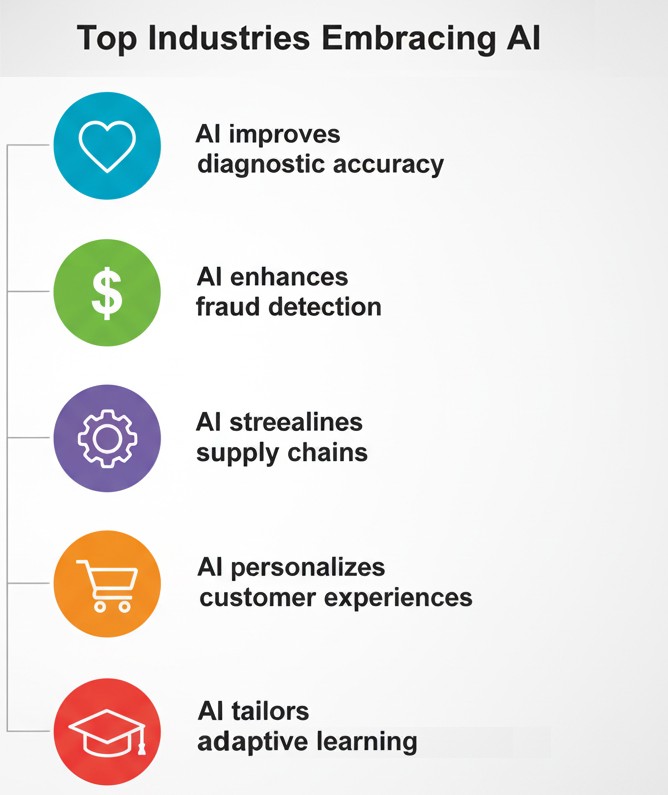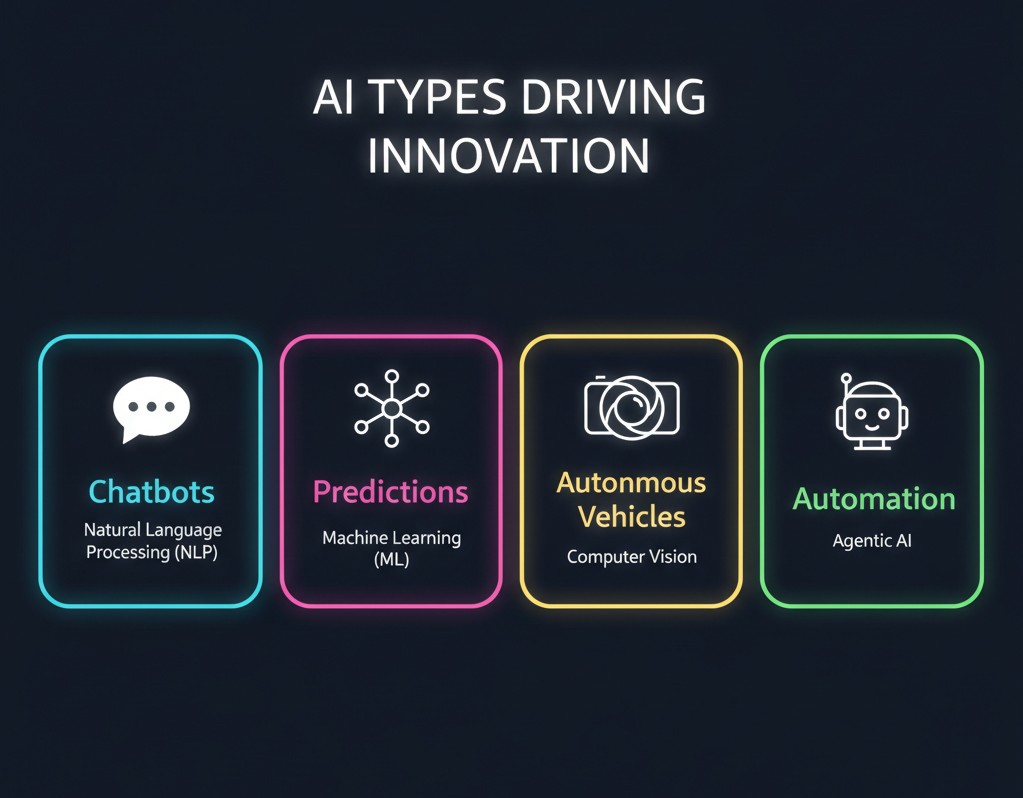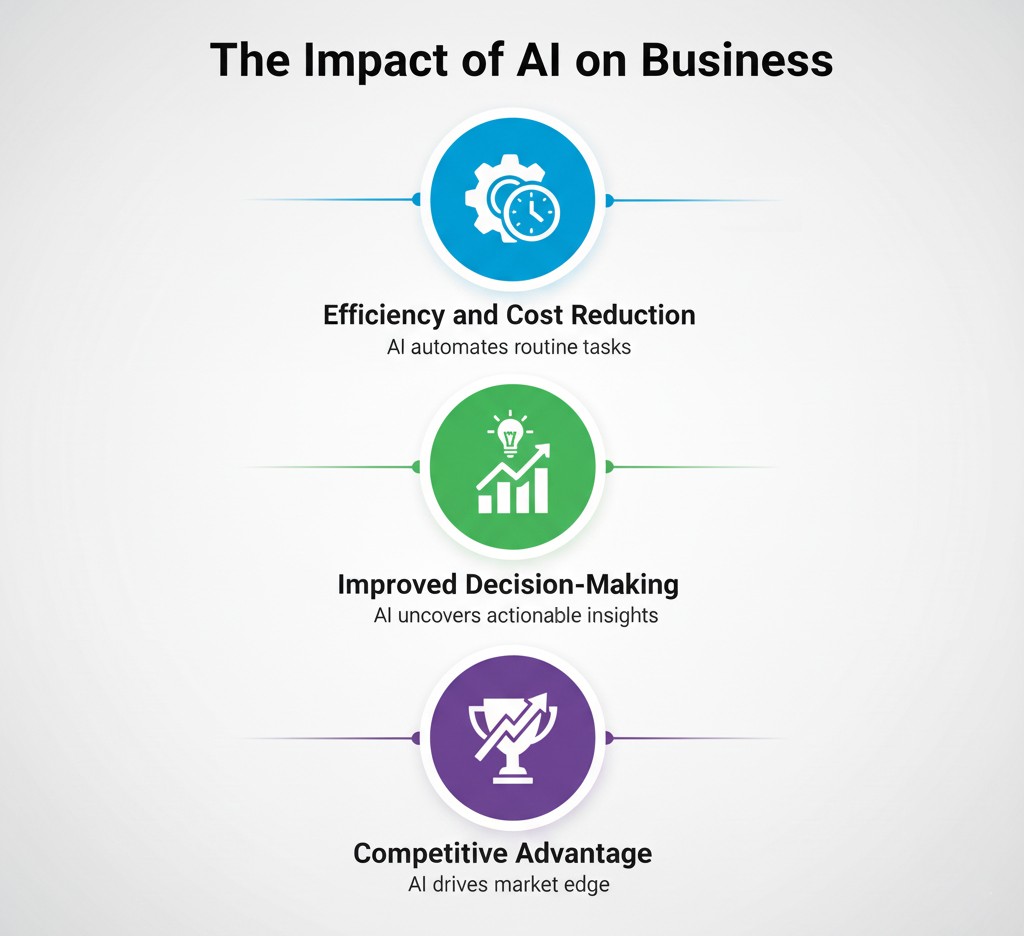Business changed when ChatGPT hit the scene in 2022-2023. The AI chatbot had 100 million users by January 2023, just two months after initially launching. Plenty of those users were professionals, entrepreneurs, and business leaders exploring how it could help them.
Today, businesses continue to invest big in artificial intelligence of all types. Machine learning has evolved to the next stage, with AI promising even more benefits. Here’s where industries are making their investments in hopes of improved efficiencies, better decision-making and gaining a competitive advantage.
Industries on the Forefront of AI Adoption
Artificial intelligence is quickly infiltrating virtually every industry, but some industries are going especially big into AI adoption. These are industries that have capital to invest and where AI has significant potential.
— Healthcare
Healthcare providers are developing AI software for everything from administration to patient care. Administrators use AI when making staffing decisions and evaluating performance. Patient care providers are using it to make more accurate early diagnosis, with AI outperforming radiologists in evaluating mammograms. There’s also potential for personalized care, assisted surgeries and more. Approximately 80% of hospitals are already implementing some form of AI, and that doesn’t include other providers, pharmaceutical companies or researchers.
— Financial Services
Finance is one of the most data-driven industries, and data analysis is one area where AI excels. Institutions are adopting AI for investment strategies and fraud detection, while clients are turning to robo-advisors for personalized guidance. Hedge funds rely on advanced trading algorithms, and banks and card issuers use AI to rapidly identify suspicious activity.
— Manufacturing and Logistics
For years, machine learning and robotics have been reshaping supply chains. The next evolution is implementing artificial intelligence, which allows robots to adapt, optimize warehouse operations, and analyze fleets with greater precision.
— Retail
Retailers, both traditional and online, are exploring how AI might increase sales. More personalized ads and experiences are an obvious method. Even more advanced strategies are starting to include personalized pricing, where AI predicts the maximum price an individual customer will pay.
— Education
Perhaps one of the most important ways AI is changing the world is in education. Adaptive learning platforms customize lessons and tests according to a student’s individual assessments, thus allowing students in the same classroom to each learn at their own level. Enhanced grading systems give teachers more time for lesson planning and provide more consistent grades across students’ work. About 60% of educators are already using AI, and that number will only grow.

Types of Artificial Intelligence Getting Funding
There’s significant investment in AI coming from both private venture capital and public research initiatives. On the private side, Andreessen Horowitz has raised billions specifically for AI startups, directing money toward companies building models, infrastructure, and new applications. On the public side, U.S. agencies like DARPA and The National Science Foundation are funding fundamental AI research, advancing robust systems, and supporting university-based programs.
Despite this broad support, the largest shares of funding are flowing into a few specific areas of AI. Some of the most well-funded are:
— Natural Language Processing (NLP)
NLP is AI that focuses on understanding, interpreting, and generating human language. This is what’s behind virtual assistants, customer service chatbots, and translation services. The processing is ultimately used in large language models (LLMs), like ChatGPT and Gemini, which are prominent examples of generative AI.
— Machine Learning (ML)
ML has been around for years, but AI represents the next stage for ML. This encompasses most of the algorithms that learn from data to make predictions or decisions without being explicitly programmed for every scenario. Streaming recommendations, fraud detection and predictive analytics are some real-world applications.
— Computer Vision
This technology allows computers to see and interpret visual information from the world. Use cases include autonomous vehicles, facial recognition systems, and quality control in manufacturing. The proliferation of cameras and sensors in our daily lives provides a large data stream for advancements in this field.
— Agentic AI
A fast-emerging focus of investment, Agentic AI refers to systems that act with a degree of autonomy, capable of reasoning, planning, and executing tasks with minimal oversight. This category is gaining significant attention for its potential to handle complex workflows and decision-making processes.

Why Companies Are Investing Big
Massive capital is flowing into AI from both the companies providing it and those using it. There are several major benefits that businesses see.
— Efficiency and Cost Reduction
The most immediate benefit is AI’s ability to automate routine tasks, streamline workflows, and optimize processes. By using AI for things like data entry and customer service queries, businesses can significantly reduce operational costs and increase productivity.
Many businesses are using AI in these ways to reduce the number of entry-level workers they need. In the future, automating through AI could give leaders more time to focus on big problems and decisions. The primary AI currently used for this are large language models (LLMs).
— Improved Decision-Making
AI’s ability to analyze datasets and identify patterns goes beyond what people can see. This affords new insights, giving business leaders better information when making decisions. Predictive analytics is helping anticipate the futures that businesses face.
— Competitive Advantage
Ultimately, businesses are always looking for a competitive advantage. Whether that’s through faster innovation, improved customer experiences, or cost savings, there are many ways that businesses using AI will gain an edge.

Using AI for Your Business
AI is likely already changing your industry, or soon will if it isn’t yet. No matter what type of business you have, you’ll need to use AI in order to remain competitive. There are several ways to get started.
Learn to Use AI
Business leaders simply need to understand how to use the many different AI tools being developed. Become familiar with the various types of AI that apply to your industry, and then learn how to use a few particular tools well.
Learning will help you gain a competitive edge now, which should also pay dividends in the future. The companies that adopt now will be better prepared as AI continues to advance and evolve. You’ll also determine how AI can be most useful to your business.
Invest in AI for Your Business
Don’t just rely on the free AI programs, nor on what you can figure out during free time. Make investments in AI:
— Delegate Staff
Reserve some employee time to learning AI. You’ll learn more when collaborating with employees, and you’ll be able to hand off applications to them once you decide how to implement the tools.
— Purchase Subscriptions
Many AI tools have free versions. These often aren’t the latest version, though, and can have limitations on how much you’re able to use them. Dedicate part of your budget to paying for subscriptions, so you can use the latest and best AI that’s available. You’ll find many subscriptions are affordable even for small businesses.
— Track Performance
Gather data on how AI is helping your business. Focus on the biggest improvements and eliminate applications which proved less helpful.

The Future of AI Adoption
Artificial intelligence’s commercial applications will only continue to accelerate. The businesses that don’t adapt to it now will end up behind their competitors. Regardless of your industry, whether you’re in one making big investments or another industry, make sure you’re starting to incorporate AI into your business operations. You’ll be aligned with market trends and position your business for growth.
⸻ Author Bio ⸻
Anne Fernandez is the Digital Marketing Manager at Ascendient Learning, which provides training courses and certification programs that upskill and reskill individuals, teams, organizations and governments to be ready for what’s next. Fernandez has more than a decade of experience in content strategy, digital advertising, and SEO. She holds certifications in Google Ads, Google Analytics, and Digital Media and Marketing. Fernandez earned her OMCP (Online Marketing Certified Professional) credential through Duke University in 2021 and continues to lead innovative marketing projects that grow visibility and engagement for Ascendient Learning.












